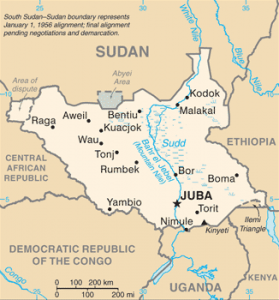NewsDesk @bactiman63
Twenty people in Warrap state, in north central South Sudan have tested positive for anthrax, according to a Sawa Sawa Network report.

Dr. John Akol, the acting director general at the ministry, said they made the declaration after samples of 20 patients suspected of anthrax, which were taken to Uganda for further laboratory tests, were confirmed positive. Akol reveals the local authorities are in coordination with the national ministry of animal resources to contain the spread of the disease.
He cautioned the residents to be much careful in eating dead animals. “The community should avoid eating dead animal meat, because anthrax is a disease for animals, but it affects humans when you eat it,” he continued.
Anthrax is a bacterial pathogen in livestock and wild animals. Ruminants such as bison, cattle, sheep and goats are highly susceptible, and horses can also be infected.
Subscribe to Outbreak News TV on YouTube
Anthrax is a very serious disease of livestock because it can potentially cause the rapid loss of a large number of animals in a very short time. Affected animals are often found dead with no illness detected.
When conditions become favorable, the spores germinate into colonies of bacteria. An example would be a grazing cow ingests spores that in the cow, germinate, grow spread and eventually kill the animal. Anthrax is caused by the bacterium, Bacillus anthracis. This spore forming bacteria can survive in the environment for decades because of its ability to resist heat, cold, drying, etc. This is usually the infectious stage of anthrax.
There are no reports of person-to-person transmission of anthrax. People get anthrax by handling contaminated animal or animal products, consuming undercooked meat of infected animals and more recently, intentional release of spores.
- Singapore reports more than 6,400 dengue cases in first four months of 2022
- Zamboanga City reports climbing dengue cases
- India Newswire: Shigella in Kerala, Malaria making a comeback in Kerala and Dengue in Delhi
- Malaysia: 2nd human rabies case reported in Selangor this year
- Pakistan: First Naegleria fowleri death recorded in 2022 in Sindh
- Bolivia: Hantavirus health alert issued for Palos Blancos
- How Acinetobacter baumannii survives without water on hospital surfaces: Vanderbilt researchers discovery


One thought on “Anthrax outbreak in South Sudan, 20 people infected”